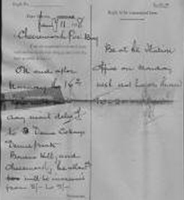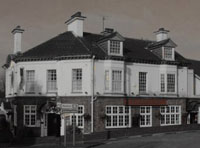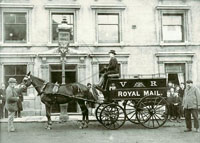
Part 2: Early working days - Part time jobs
Another extraordinary character who I never forget was ‘Shuck’
Pollard – I never knew him by any other name than ‘Shuck’. He lived
in a quaint little, half-timbered cottage (now demolished) in Park
St. This cottage, in spite of its timbering, Horsham stone roof and
wattle and daub plastering (Shuck called it ‘rattle and dab’), was
in a sorry state of disrepair but kept spick and span by Mrs.
Shuck. She was a Lancashire woman, horribly marked by smallpox, but
about the tidiest, cleanest, most efficient housewife I have met.
Every bit of metal that could be cleaned and polished was
burnished. There were no carpets or rugs on the floor but a clean
sack for a hearth rug which I should think, like Shuck’s corduroy
trousers and blouse, were washed every week. The floors upstairs
and downstairs were not washed but dry-cleaned with sand and dry
hearthstone brick. And what a cook! Old John Fawn, for whom Shuck
did an occasional day’s work, gave her a very small-sized but heavy
chamber pot that lost its handle en route from Staffordshire and so
was unsaleable. Mrs Shuck converted this into a cooking utensil for
Lancashire Hot Pot, and I think I never tasted anything nicer than
food cooked in this chamber pot with a plate for a lid. We lived a
few yards from the Pollards and sometimes, after Shuck and I had a
busy afternoon cleaning ash pits, he would say, “Come on, boy,
let’s go and see what the Missus can fish out of the jerry!”
I was about 12 or 13 then and supposed that Mr and Mrs Shuck
were rather well off by the way they lived. I now know the reverse
was the case. They were a childless couple who really lived for
each other, but I am sure it was Mrs Shuck’s efficiency between
them and the condition of the average casual labourer’s home.
Shuck, by the way, had a kind of withered left arm which of course
was a serious handicap when using a shovel; instead of laying the
handle in the palm of left hand for the lift, he would bring down
his weak left arm like the jib of a crane and grasp the handle with
his fingers like the claws of a big bird. I used to practice the
same trick and found it very useful in a confined space like an ash
pit.
Another valuable connection my father had in those days, say from
1886 to 1896, was with the Post Office. On and off, all through the
summer, he or I would do relief work while the Rural Postman had
their two weeks holiday. We were trusted with every rural round
issuing from Horsham Post Office.
 A summons from the Horsham Post
Master, 1888
A summons from the Horsham Post
Master, 1888
Some rounds needed a horse and cart, others were walking rounds.
The result was we knew every house, and who lived in it, for 8 or 9
miles round Horsham. A sample round which we did for many years was
called Champions Gate. On arrive at Horsham Sorting Office in time
to sort the letters in the bin, and leave the office at 5 a.m. The
route was via Southwater where we left the Shipley letters for
delivery by the local man, delivering all the way to Cripplegate
and Burrell Arms where we left letters for Dial Post. Here we
turned left for West Grinstead Station Office again leaving all
local letters, again for local man to deliver.
 Burrell Arms
Burrell Arms
Then on to Champions Gate, the site of an old tollgate midway
between West Grinstead Station and Cowfold. At Champions Gate, the
regular Postman, Wallace Coppard[1],
had rented a paddock and built a stable, so here we turned the pony
out to grass and walked back to West Grinstead Station in time to
catch a train at about 10 o’clock. If you missed that there was
another at 12.30. The Postman or his substitute was then free till
3 o’clock when he caught a train from Horsham to West Grinstead,
walked to Champions Gate, and started the return journey. This was
due to finish at Horsham office at 8 p.m.
 Royal Mail coach outside post
office, Horsham, Courtesy of West Sussex Past Pictures; Ref:
PP/WSL/P002760; West Sussex County Council Library Service;
Image credit.
Royal Mail coach outside post
office, Horsham, Courtesy of West Sussex Past Pictures; Ref:
PP/WSL/P002760; West Sussex County Council Library Service;
Image credit.
The wage for this, both for regular man and for substitute, was
16/- for the man plus 16/- horse allowance (note: horse, cart,
harness etc. was provided by the Postman or Sub). It is interesting
to note in these days of agitation over “broken horses” that the
Postman was round and about for 16 or 17 hours from the time he fed
and groomed his pony in the morning till he finally fed him and
tucked him up for the night, and this for 16/- per week and
uniform.
Another source of income, rather irregular but possible all the
year, was evening “porterage” of telegrams. There was no telephone
and many country offices were not connected by telegraph. The
charge for porterage, after the first mile from Horsham Office, was
6d per mile. Telegraph boys collected this charge on delivery up to
6 o’clock. After that the telegram was sent by substitute
messenger, again my father or I. A regular boy would bring the
telegram round to our house with the porterage marked on the
envelope. This we were entitled to collect and keep, and this
formed at times a valuable addition to the family funds.
Share this
page (third party services may set cookies)